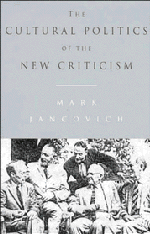Book contents
- Frontmatter
- Contents
- Preface
- List of abbreviations
- Part I The New Criticism and its critics
- Part II The formation of the New Criticism
- Part III The establishment of the New Criticism
- Part IV The development of the New Criticism
- Conclusion: Modernism and postmodernism within the American academy
- Introduction
- 13 The professionalization of literary study
- 14 The New Critical intervention
- 15 Cultural criticism and postmodernity
- Conclusion
- Notes
- Bibliography
- Index
- Frontmatter
- Contents
- Preface
- List of abbreviations
- Part I The New Criticism and its critics
- Part II The formation of the New Criticism
- Part III The establishment of the New Criticism
- Part IV The development of the New Criticism
- Conclusion: Modernism and postmodernism within the American academy
- Introduction
- 13 The professionalization of literary study
- 14 The New Critical intervention
- 15 Cultural criticism and postmodernity
- Conclusion
- Notes
- Bibliography
- Index
Summary
According to contemporary wisdom, the New Criticism is dead. This is certainly true in so far as many of its key practitioners are now deceased: and with the recent death of Robert Penn Warren, all of the three critics dealt with in this book are now no longer with us. As a movement, the New Criticism is also dead; its missionary zeal dissipated by its own success. Even its critical positions are now the favourite whipping boy of most contemporary theorists. However, this continual need to repeat the dismantling of the New Criticism suggests a kind of presence which needs to be addressed. As we saw at the start of this book, Lentricchia argues that while the New Criticism is dead, ‘it is dead in the way an imposing and repressive father figure is dead’. Contemporary criticism's very sense of identity is denned through its opposition to the New Criticism which is therefore never absolutely absent. For Lentricchia, however, this is largely a matter of self-identification (or an ‘anxiety of influence’ to borrow Harold Bloom's phrase): after all, Lentricchia himself insists that ‘in an offical sense, of course’, the New Criticism is dead!
As William E. Cain points out, this situation is misleading: if today the New Criticism seems to be dead (because everyone speaks against it and no one speaks for it), ‘it seems so powerless only because its power is so pervasive that we are ordinarily not aware of it’.
- Type
- Chapter
- Information
- The Cultural Politics of the New Criticism , pp. 137 - 138Publisher: Cambridge University PressPrint publication year: 1993



